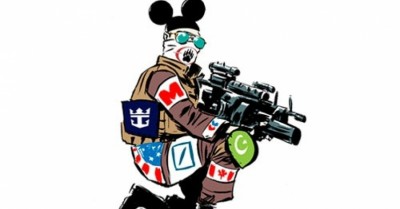The Unholy Marriage of War and Disney

In September 2001, the Bush administration launched its “global war on terror,” to which its supporters later tried to attach names like “the long war” or “World War IV.” Their emphasis: that we were now engaged in nothing less than a multi-generational struggle without end. (World War III had theoretically been the Cold War.) In fact, only the “war on terror” would stick and, in 2009, even that would be tossed overboard when the Obama administration opted for a global war with no name at all. Nonetheless, the idea that we were now in an eternal “wartime” became part of the post-9/11 atmosphere. At the same time, George W. Bush famously called on Americans to act as if everything were normal — to spend, vacation, and visit Disney World.
In other words, the “homeland,” protected in new ways, was to be locked down and at peace, while Washington was to be a war capital into the distant future. In the process, the Bush administration invoked warring powers of every sort — from torture and offshore imprisonment to assassination and warrantless wiretaps. At the time, all of this seemed like a unique combination, but looking back, the marriage of war and Disney, of military might and consumerism, has a far longer history. Considered a certain way, Washington has been a war capital since December 7, 1941, and certainly the global capital of consumerism since at least 1945.
Unlike after World War I, post-World War II demobilization proved to be anything but complete. The various structures of the relatively new national security state and its intelligence networks, as well as the U.S. military, were left largely in place and soon expanded massively, as were the array of global bases from which the U.S. had fought its world war. From 1945 on, as the Cold War gained strength and staying power, war was distinctly on Washington’s agenda. In a big way in Korea and Vietnam, of course, but also globally in what was then called “the shadows.” And it didn’t end when the Soviet Union began to totter and finally imploded. The 1980s and 1990s saw a range of interventions, invasions, raids, air strikes, and the like in Afghanistan, Grenada, Lebanon, Libya, Panama, Serbia, Somalia, and of course Iraq (again and again). In the twenty-first century, the U.S. military was simply let loose across the Greater Middle East and North Africa and eternal war (as well as military-first policies of all sorts) became the American Way. Meanwhile, in Washington, there arose a war-hawk party in Congress and beyond who never saw a military solution that didn’t appeal to them (no matter how ineffective it had proved in its previous incarnations). All of this, in turn, took place in a country in which corporations were mobilized to go to war while the population itself was demobilized in just about every way imaginable. In other words, Americans became ever more divorced from their military and ever more fawning about it.
As retired Air Force Lieutenant Colonel and TomDispatch regular William Astore makes clear today in “The American Military Uncontained,” there was something increasingly uncontained about this phenomenon (and the funding and building of the U.S. military and the national security state that went with it). In a sense, Americans have yet to come to grips with what a never-ending “wartime” has meant in and to this country. Astore offers a place to start.
Tom Engelhardt, co-founder of the American Empire Project, runs the Nation Institute’s TomDispatch.com. His latest book is, Shadow Government: Surveillance, Secret Wars, and a Global Security State in a Single-Superpower World (with an introduction by Glenn Greenwald). Previous books include Terminator Planet: The First History of Drone Warfare, 2001-2050 (co-authored with Nick Turse), The United States of Fear, The American Way of War: How Bush’s Wars Became Obama’s, The End of Victory Culture: a History of the Cold War and Beyond, as well as of a novel, The Last Days of Publishing. To stay on top of important articles like these, sign up to receive the latest updates from TomDispatch.com here.

